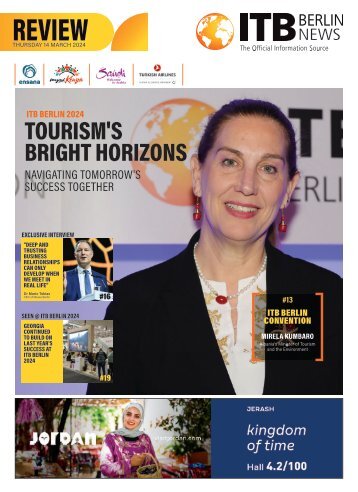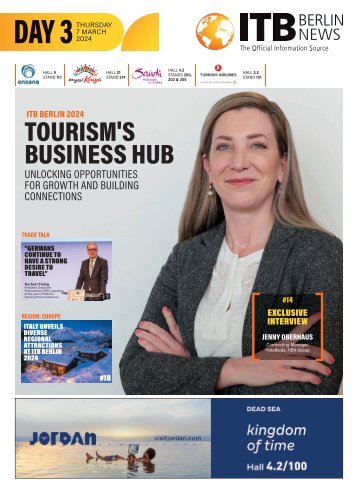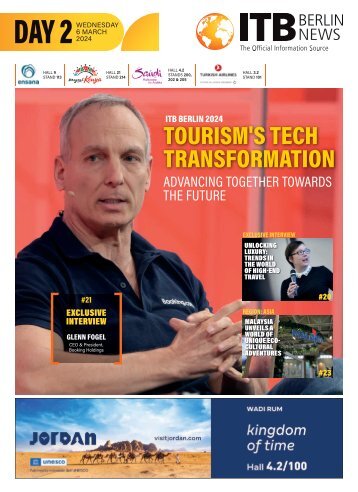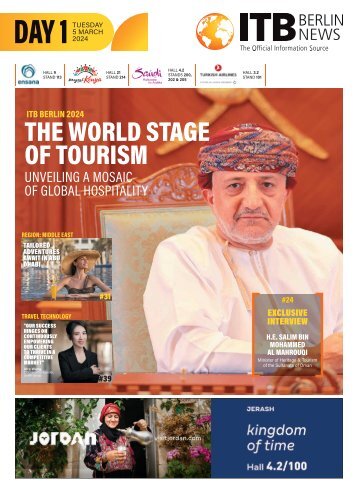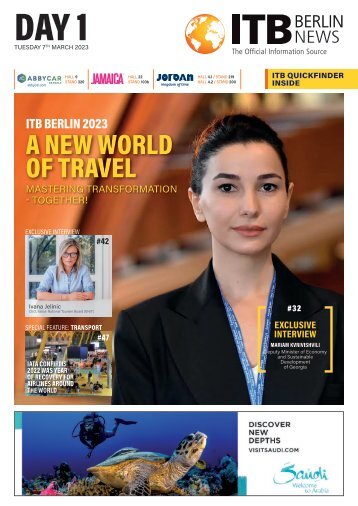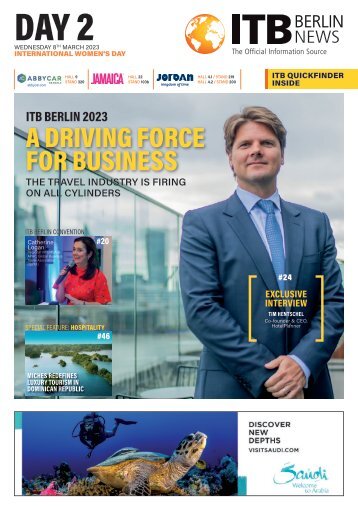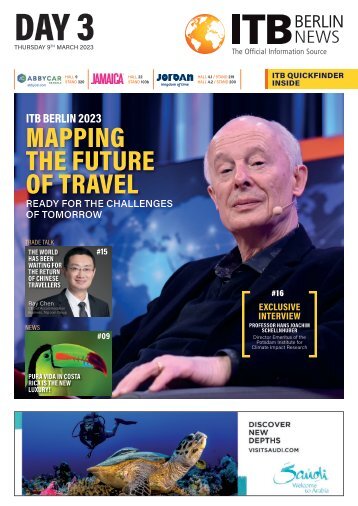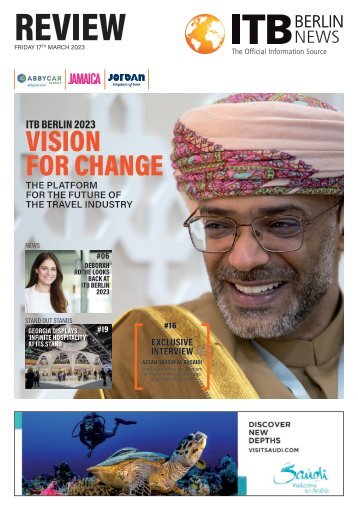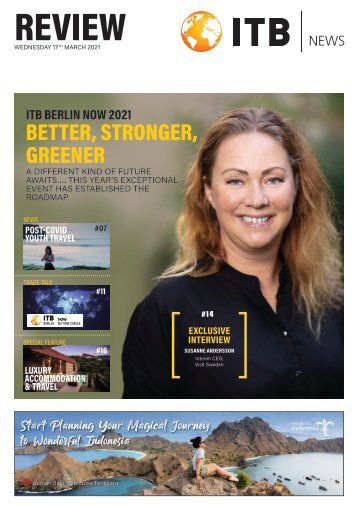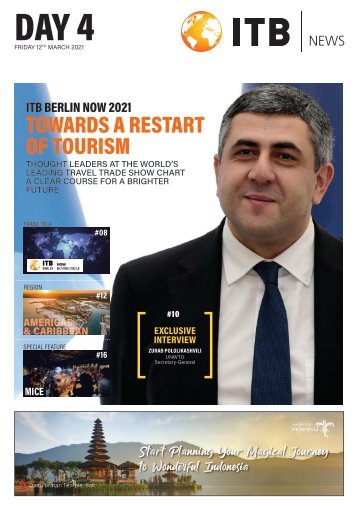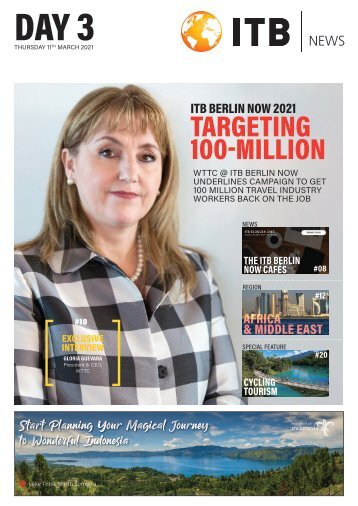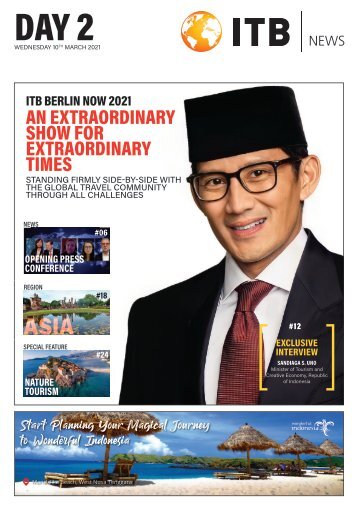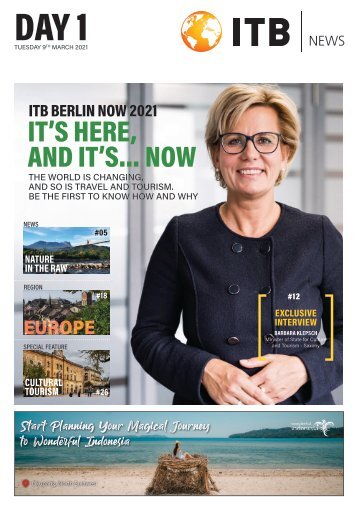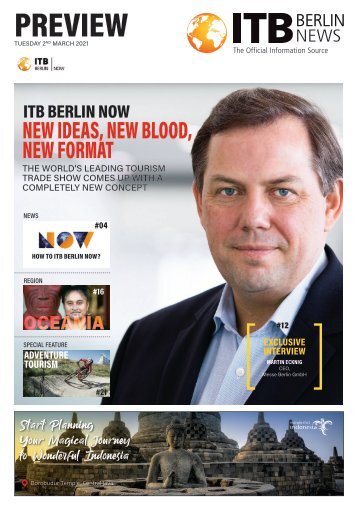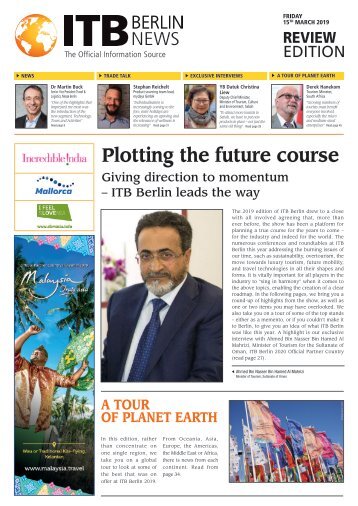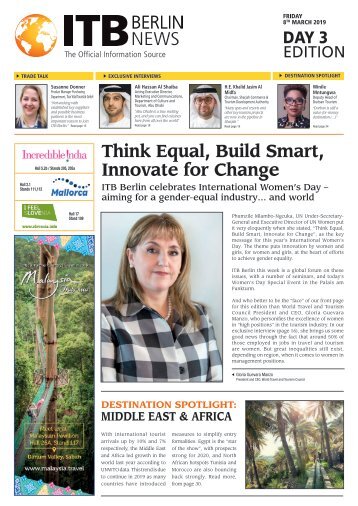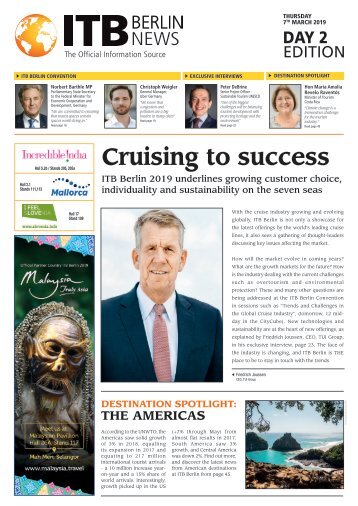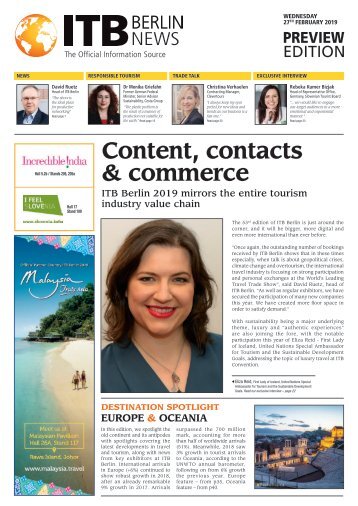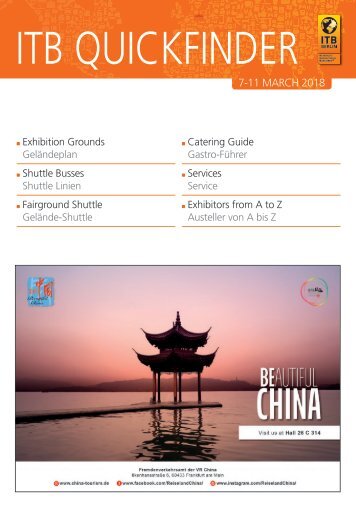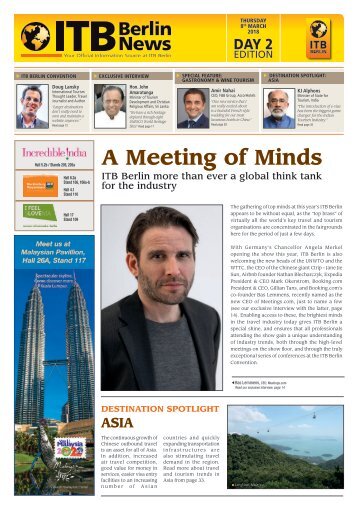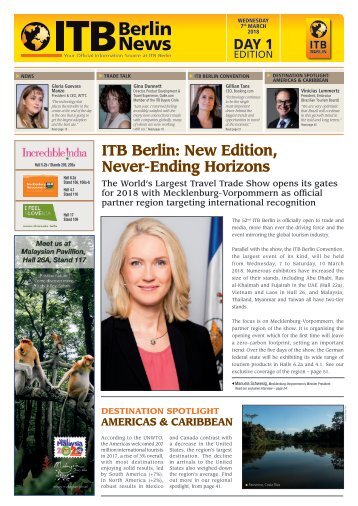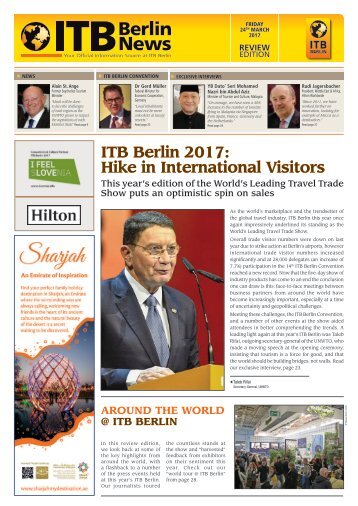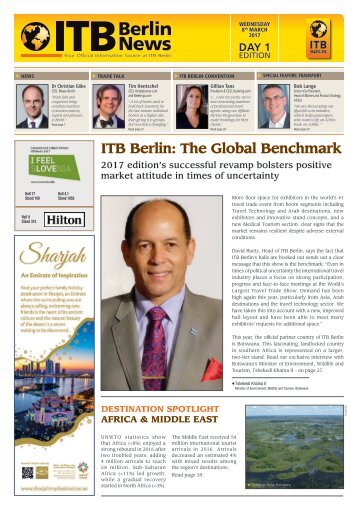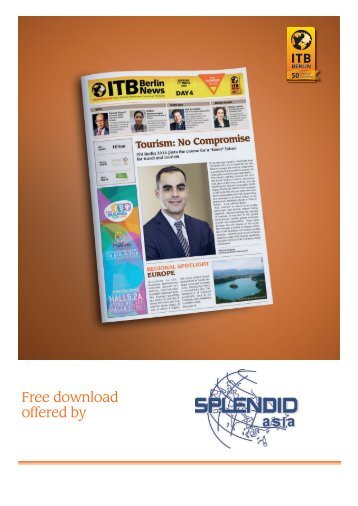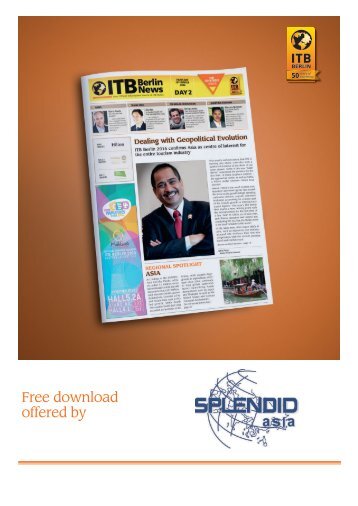
ITB Berlin News - Day 2
- Text
- Tourism
- Hotels
- Resort
- Tours
- Resorts
- Berlin
- Exhibitors
- Halle
- Tourismus
- Aussteller
10 NEWS © Messe
10 NEWS © Messe Berlin FROM ‘66TO‘16 50 glorious years of ITB – stepping back in time Moosa Zameer Maldives Minister for Tourism This year is the 50 th anniversary of ITB Berlin, marking a genuine success story “made in Berlin“. Each of this year’s editions of ITB Berlin News looks back at one of the highlights… PART THREE Maldives Shows True Colours Moosa Zameer, Minister of Tourism of the Republic of Maldives, outlines key reasons to visit ELECTRONIC SYSTEMS AND ALTERNATIVE TRAVEL PRODUCTS AND SERVICES: TRENDS IN THE EIGHTIES Moosa Zameer, Minister of Tourism of the Republic of Maldives, is attending ITB Berlin on behalf of the Official Partner Country. He was on hand at ITB Berlin’s opening press conference to tell the assembled international media about the many developments in the flourishing Maldives tourist market, and spoke to ITB Berlin News about the partner country’s commitment to promote tourism sustainability, safety, to reach out to major hotel brands, and to highlight the importance of the environment. The Maldives has one of the largest coral reef atolls in the world, in addition to 300 species of coral and more than 1,000 species of fish. Our tourism, our economy and our environment go together. Without our environment we would not have our tourism and we would not have our economy. So we need to ensure that our environment stays healthy. Every new hotel development has to have an environmental impact study, while over the past 20 years all of the resorts in the Maldives have gone through a rigorous environmental impact assessment. We are also promoting more renewable energy, including solar. One of our targets for 2018 is for 30% of daytime energy to come from renewable energy. We want to ensure that these environmental and climate change policies are embodied in our development. Lastly, we have one of the first atoll-based biospheres in the world that has now been UNESCO certified. One of the areas is where sharks and manta rays are conserved and can be observed by tourists. We are working to see if the whole of the Maldives can be designated as a biosphere. How are you working with the other Vanilla Islands Alliance members such as Seychelles, Mauritius and Madagascar? We believe there is much we can do together to ensure that resources are shared. If you look at the premier hotelier beach destinations, Maldives is regularly among the number one locations and we can share our experience, not only as a top tourism market but in terms of sustainable tourism. Which market segment will you be focusing on at ITB Berlin and will you be allaying some isolated concerns about safety issues? Our main focus is going to be in the luxury segment of the tourism industry, which is rapidly increasing, despite discussion about safety issues. If you look at the period from November 2015 to now, many celebrities and famous people have visited the Maldives because there are no safety issues. There has never been a terrorist incident where a tourist has been attacked. Our people understand that our livelihood relies on tourism and we offer great hospitality and ensure the safety of our visitors. It is important that all the major hotel brands from the major European countries who are looking to start new resorts in the Maldives and are making massive investments are aware of this fact - especially as we increase the capacity of the main international airport from 1.5 to 7.5 million arrivals over the next three years and build additional international airports in the south and north. Hall 5.2 A / Stand 109, 109a ITB Berlin 1986 - Mexico During the Eighties, ITB Berlin established itself as a pioneer by introducing and showcasing new technologies. BTX was already being used to display trade fair information in 1981, for instance. Two years later, ITB Berlin joined the ongoing lively debate about “new media“. In 1988 at ITB Berlin, Galileo and Amadeus with their innovative electronic information systems and the START reservation system using BTX were two examples of the level of change affecting the industry. Over the years, ITB Berlin had also established a strong image with its content and was increasingly becoming a driving force in the tourism industry. When criticism arose of the more problematic aspects of tourism, ITB Berlin presented new and alternative travel products and services. In 1984, a special exhibition took place on the topic of alternative travel and barrier-free services, elements that are still focused on to this day. ITB BERLIN NEWS • Thursday 10 th March 2016 www.itb-berlin-news.com
NEWS 11 CSR: A Leading Light from Nepal Raj Gyawali, Socialtours, Addresses ITB Berlin The Friday of ITB Berlin will open with an interactive yoga session. Raj Gyawali, founder and director of Socialtours, will explain how, through yoga, one can help to generate donations and raise awareness for children’s rights. Socialtours plays a lead role in the activities and practices of the Sustainable Tourism Network in Nepal, the MAST program, and a leading role in the Fringe RT Network worldwide. We asked Mr Gyawali to tell us a little more about “post earthquake” Nepal. Post Earthquake, there is a certain energy in the industry, come out of working together over a common hardship. The synergies that usually happen when these sort of energies exists always results in change and I think Nepal is reemerging as a stronger destination - with a better product base, better differentiation. Newer projects have also seized this lull in the market to emerge. The adventure image will always be there, but I think there will be a stronger focus on soft adventure - opening up Nepal to a wider audience worldwide. What is your “message” at ITB Berlin? At ITB Berlin, my company socialtours hopes to stand out, as stated above, amongst the noisy market, with our very well differentiated products, presenting a new look at Nepal, especially post earthquake. Once that stand out is achieved, then of course the business follows in its footsteps. We are hoping to make a mark in Yoga and Nepal with two events on day 1 and day 3 at Hall 4.1b, and with a panel discussion on NepalNOW and its process of recovery on Day 3. We also hope to meet colleagues and friends from the responsible tourism world at the annual RT Networking event on Day 3. Raj Gyawali Founder and Director, Socialtours Why is CSR so important? CSR in tourism is a must, not only in Nepal but globally. The ramifications of tourism tend to be very deep, and stakeholder bases of even the smallest operations quickly expand to hundreds. In this scenario, it is important that operations are run responsibly and sustainably. It can also be a very powerful tool for differentiation in a very noisy and competitive market, which tourism usually is. So it also really makes business sense. ITB BERLIN NEWS • Thursday 10 th March 2016
- Page 1 and 2: Free download offered by
- Page 3: WEDNESDAY 7 th MARCH 2015 THURSDAY
- Page 9: NEWS 9 Taleb Rifai, UNWTO Secretary
- Page 13: TRADE TALK 13 Meet Tuniu Chinese tr
- Page 16 and 17: 16 EXCLUSIVE INTERVIEW Indonesia…
- Page 19 and 20: GOLF TOURISM SPECIAL FEATURE 19 Maj
- Page 21: LUXURY SPECIAL FEATURE 21 Welcome T
- Page 25 and 26: ADVERTORIAL LUXURY SPECIAL FEATURE
- Page 27 and 28: CRUISES SPECIAL FEATURE 27 The Call
- Page 29 and 30: SHOPPING TOURISM SPECIAL FEATURE 29
- Page 31 and 32: NATURE TOURISM & NATIONAL PARKS SPE
- Page 33 and 34: NATURE TOURISM & NATIONAL PARKS SPE
- Page 35: ASIA REGION 35 Strong Growth Contin
- Page 39 and 40: ASIA REGION 39 ADVERTORIAL © The D
- Page 41 and 42: ASIA REGION 41 NEW AT ITB: ASIA’S
- Page 43 and 44: ASIA REGION 43 Transforming Gangwon
- Page 45 and 46: ASIA REGION 45 The Rising Sun of To
- Page 47 and 48: © Thomas Keller HOSPITALITY / REST
- Page 51 and 52: ITB QUICKFINDER 9-13 MARCH 2016 Exh
- Page 53 and 54: Hall 26 A / Stand 106b Hall 26 A /
- Page 55 and 56: CATERING GUIDE & OPEN EXITS EVENING
- Page 57 and 58: EXHIBITORS FROM A TO Z / AUSTELLER
- Page 59 and 60: A / B EXHIBITORS / AUSSTELLER HALL
- Page 61 and 62:
B / C EXHIBITORS / AUSSTELLER HALL
- Page 63 and 64:
C / D / E EXHIBITORS / AUSSTELLER H
- Page 65 and 66:
E / F / G EXHIBITORS / AUSSTELLER H
- Page 67 and 68:
G / H / I EXHIBITORS / AUSSTELLER H
- Page 69 and 70:
I / J / K / L EXHIBITORS / AUSSTELL
- Page 71 and 72:
L / M / N EXHIBITORS / AUSSTELLER H
- Page 73 and 74:
N / O / P / Q EXHIBITORS / AUSSTELL
- Page 75 and 76:
Q / R / S EXHIBITORS / AUSSTELLER H
- Page 77 and 78:
S / T EXHIBITORS / AUSSTELLER HALL
- Page 79 and 80:
T / U / V EXHIBITORS / AUSSTELLER H
- Page 81:
V / W / X / Y / Z EXHIBITORS / AUSS
Inappropriate
Loading...
Mail this publication
Loading...
Embed
Loading...
